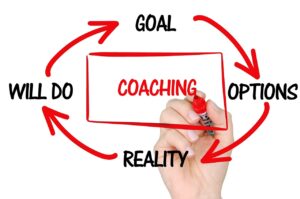What is a business coach? How do you find the right one?
The online business world is overflowing with potential. Content creators and service providers have unprecedented opportunity to reach the people that they can serve best.
But the internet ISN’T a magic money machine. It’s not “turnkey.”
Online business owners are often the ultimate DIYers, assembling their dream projects from literally anywhere with just a laptop and a wifi signal. What they can’t figure out, they look up for free online.
Eventually, though, that stops working. Information overload and lack of ability to sift through bad advice lead to overwhelm – and lack of progress. Most of us get stuck somewhere, sometime, as we are building our businesses.
Purchased courses can be a big help. They can, however, also lead to a very slow bleed, as you sign up for more and more expensive courses only to find that you still aren’t seeing the results you want.
Enter: the business coach.
Table of Contents
ToggleFirst things first: what is a business coach?
A business coach is usually an experienced, successful entrepreneur themselves, and they have decided to use those skills to help other business owners succeed.
A business coach’s task is to help a business make, reach, and exceed big goals. To do that, a coach will help clarify and establish realistic and exciting goals, and then they will help plot out clear plan to accomplish those goals. They are there with you along the way, standing with you as you navigate, succeed, fail, make course corrections, and learn from your mistakes.

Benefits of getting a business coach
There are many benefits to business coaching. Saving time and increasing profits are the most obvious, but there are other important perks as well.
Save time
One of the best advantages to getting a business coach is that they can save you time – and a lot of it.
Just like it is much easier and faster to learn other skills – music, sports, etc. – from a skilled teacher, it is also much faster to learn business skills from someone who knows what skills you need, when you need them, and how best to teach them to you.
The age of information means that most everything can be learned online for free, but it can take YEARS to wade through all the extraneous information out there. Figuring everything out on your own is tough, and the mistakes you will make along the way can be costly. The danger of simply running out of time and money to the point that you quit entirely is real.
A coach is the ultimate shortcut – they already know the ins and outs of online business, and a good coach’s superpower is combining their knowledge and skill with your passion to get your business moving – now.
More profits
Time is money – it’s a cliche for a reason.
Your coach can save you a lot of time getting your business headed in the right direction – which equals money in your pocket. An entrepreneur’s time is the most valuable asset they have.
A coach can often improve a business’s profits and bottom line pretty quickly, starting early with a few tweaks. Over time, the different in cash flow can be dramatic.
Less stress
Think about going on a long road trip – say, all the way across the country, on a tour, with lots of sights along the way. You’re dreaming of a specific destination. You’ve budgeted out what you can spend before you run out of cash.
If you’re an adventurous sort, that sounds fun, right? Sure.
But now think about trying that without a clear plan, or the tools to form one. You google a few things, gas up, and off you go. No solid itinerary and no GPS.
If you ever make it to your destination at all, that trip is going to be way more stressful and expensive than it needed to be. Right?
If you think of your business as a journey, your coach is your travel guide. They have been on many, many journeys, by many routes, with many kinds of people.
They know what it takes to get where you want to go. You’ll get there in a way that resonates with who you are and the life that you are building – and having that itinerary can lift a world of stress off your shoulders.
Constructive criticism
We all need someone who will give it to us straight.
Business owners really need constructive criticism from someone objective.
A spouse, a friend, a family member – these folks care about us. But, they don’t always know what the next move should be for a business, and they also might hesitate to call us out when we really need it.
That’s a coach’s job. If they see problems in how the business is being run, they can bring those up without any personal baggage getting in the way. That is a huge asset to a business owner.
Breaking through limiting beliefs
Limiting beliefs are beliefs that restrict how we see the world; they limit us in some way. They are usually rooted in our past experiences – and they often keep us from taking action that would be best for us.
Limiting beliefs can come from your parents and childhood, past failure, culture, etc. You don’t necessarily have to know where your limiting beliefs came from – but you do have to deal with them.
Two kinds of limiting beliefs that can hold your business back are limiting beliefs about money, and limiting beliefs about yourself.
When you have limiting beliefs about money, you push money away from you. Negative thinking becomes a self fulfilling prophecy, as you focus on negativity and lack. When you don’t believe that you deserve success, you will be subtly sabotaging your business.
Limiting beliefs about yourself can lead you to believe that you and your expertise are never enough. This can cause all kinds of issues, and really hold back a business that is otherwise ready to take off.
A good coach can help a business owner identify limiting beliefs, and overcome them. Without a coach’s objective advice, those beliefs might hobble a business for years to come.
Coaching vs. courses
Courses are great! I love courses, and buy and use them to grow in different areas. They are great for filling in gaps in knowledge, especially technical .
Courses
The main difference between coaching and courses is that courses are self directed and low-touch. They also come at a lower price point than coaching.
The lower cost is appealing, and carries less financial risk. But, partly because of the lower investment, course students frequently don’t finish or implement what they are learning.
Also, no one personally holds you accountable in a course. It’s important to know yourself: are you someone who will be able to do this well, mostly on your own? Or would you make better progress if you had a more personal experience?
Coaching
Hiring a coach is a very different experience from taking a course.
Instead of being self-directed, you’ll have someone in your corner, holding you accountable to your goals. You’ll have in mind both the big picture and also the steps it will take you to get there.
Your coach has direct access to your business; they can stand with you as you make tough decisions, pioneer new ideas, and work through tough mindset issues that keep you stuck.
Business owners that hire a coach will make much faster progress than those who do courses alone. That progress, though, does come with the risk of a greater financial investment.
This is a critical part of the decision between course and coach: there is a choice between higher risk for the potential of faster and better progress, or lower risk for slower progress. That choice will look different for every person in every situation.
1:1 Coaching vs. group coaching
Group coaching is more affordable than 1:1, has less support (but more support than a course). Usually, group coaching has some kind of course content/plan to it, so that you are going through the material together with a group of people at a similar level to you.
This is another place where you have to gauge the tradeoff between more support/higher cost and less support/lower cost.
A word about masterminds
In the current coaching industry climate, the term “mastermind” can have more than one meaning. Be sure to get clear on what you are getting into before you sign up for a high ticket program!
Sometimes, a group coaching program might get called a “mastermind.” However, the original meaning of the word is for a group of equals who come together share ideas and experience, without necessarily having a specific teacher or program to follow.
Because of this confusion, if you join a mastermind, you could end up in a group where you will be well supported – or you might also end up in one where you are really just paying for the high-level environment. There’s not necessarily anything wrong with that, but it’s not the same thing as coaching.
The true purpose to join a classic mastermind is to be immersed in an environment of people that you want to commiserate with and share ideas with. There is not, typically, any course content or much individual guidance. They can be very valuable in the right situation, but the purpose is different than a coaching program.
What to expect – how coaching works
You can expect to have regular meetings with your coach, on a schedule that you’ll work out together. Different coaches have different approaches to communication, but there will likely be some way to ask questions and get assistance in between. Be prepared to share both the hard numbers of your business, as well as more personal details about your goals and dreams for your business. A coach skillfully combines those elements into a solid plan to get you where you want to be.
Business Coach vs. Marketing Coach
A related, but different, kind of coach that you might consider is a marketing coach.
A marketing coach is similar in some ways to a business coach, but they will specialize in visibility: finding leads, social media, and advertising strategy.
A marketing coach will get an idea of your vision and goals to make sure you come up with a marketing strategy that is right for you, but typically, it’s outside their sphere to help you establish your vision and overall product strategy, work on your mindset, and those kinds of more global issues that a good business coach will address.
Like a business coach, a marketing coach is a teacher and a guide. They can help you save time, and prevent expensive mistakes. Also like a business coach, they will not do the work for you – if you want someone to just take over your marketing, you’ll want to look for a marketing consultant instead.
- A marketing coach can be extremely beneficial if you:
- Already have a strong vision for your business
- Already know what to sell and how to sell it
- Have strong systems and plan in place
In those situations, it’s time to crank up your visibility to begin to scale your business, and a marketing coach will be skilled in showing you how to do that effectively and efficiently.
On the other hand, if you DON’T already have a strong product stack, vision, and mindset, you won’t benefit as much from a marketing coach, because you simply aren’t ready to amp up your visibility. You will be better off with a business coach who can help you get all those pieces in place first.
How to find and choose a business coach
It can be really challenging to find the right business coach. I recently hired a new coach myself, so I can share with you my own recent experience.
The first place to look for a business coach is in your own network. Reach out, ask around, and see if you can find some good referrals. A personal referral is great, but you can also ask for referrals in any relevant groups you are in on Facebook or LinkedIn. Be aware, though, that you may be inundated with names, and unfortunately not a lot of information to go with them. Wading through it all will take time. When I did this recently myself, I qualified my search by only asking for referrals that were making over a certain income level – but I still ended up with over 100 names and very little else to go by.
In the end, a couple of those coaches reached out to me, and one of them was also recommended by another group. So, I began to consider those ones.
Narrowing it down
At that point, when you have narrowed your choices to two or three options, there are some crucial steps to take:
- Look at reviews and results. If you can, talk to people that have worked with them.
- Take your time deciding. This doesn’t mean you necessarily have to take a long time, but don’t rush it.
- Reach out and have a conversation with them; it’s very important that you feel that you can work well together.
- Journal out how you want your next coaching experience to look and feel. If you take the time to really get in touch with what exactly you are looking for in a coach, you will be able to tune into whether a coach that you are vetting is going to provide the experience that you want.
- Be clear on exactly what you want; I knew that I wanted a 1:1 experience, not a mastermind or group coaching situation. Being clear on that helped me be sure I was choosing the right program.
- Keep an open mind. Don’t let a poor money mindset or fear of failure keep you from taking the actions that will benefit you the most.
In the end, a business coach’s job is to help you tap into your own potential, and help you discover and realize the ways that you can be excellent – and profitable – in the online business world.
Need more support?
If you have any questions, feel free to drop me a comment below.
And, if you are interested in working with me for business coaching, book a chat with me at: https://AlisonReeves.Co/strategy-call






